Frequently Asked Questions
Here we answer frequently asked questions about well drilling, water quality, water filtration systems, well pump repair, sprinkler system repair and more. We’re located and service areas in Stuart, Palm City and Port St Lucie, FL and beyond.
Did we miss a question you have? Give us a call or email us and let us help you get informed so you can be the water solution hero.
What is an aquifer?
Did you know that around the world 97% of the available clean refreshing water we drink comes from well water or groundwater sources?
“Aquifers” is another name for a major reservoir of groundwater.
Consolidated or unconsolidated formations make up the two kinds of aquifers with consolidated being composed of rock that is cracked or has caverns where the water exists and unconsolidated formations consist of gravel, sand or loose soil material where the pore space is saturated with water.
What kind of water wells are there?
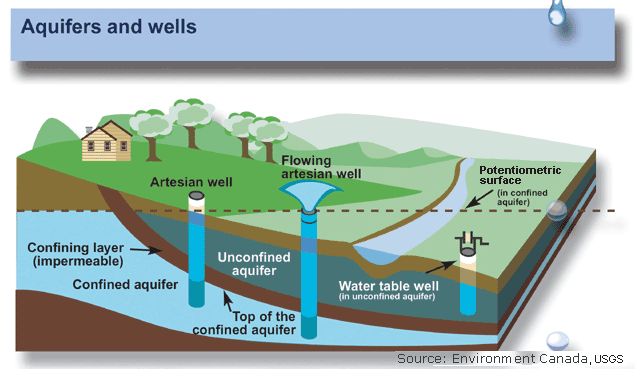
Most wells fall into one of three categories, free streaming artesian wells, gravity wells, or a combination of artesian and gravity (most home water wells and industrial wells are comprised of this type which is referred to as a pumped artesian wells) (Figure 1).
The kind of aquifer containing the water is what determines the type of well. Gravity wells penetrate down to unconfined aquifers. In this kind of well, the static water level and the water table are the same (also described as the piezometric surface of an unconfined aquifer).
When a confined aquifer has the necessary hydrostatic weight in adequate amounts artesian conditions bring the water completely to the surface the well is then called a free flowing artesian well. The photo shows the basic conditions for a non-streaming and also a free flowing artesian well.
Wells can also be described as shallow or profound. In some cases large quantities of water may be readily accessible from shallow aquifers however a careful examination of the shallow water aquifer should be executed before excavation to ensure such access will not readily diminish the water supply.
Aquifers is another name for a major reservoir of groundwater.
Consolidated or unconsolidated formations make up the two kinds of aquifers with consolidated being composed of rock that is cracked or has caverns where the water exists and unconsolidated formations consist of gravel, sand or loose soil material where the pore space is saturated with water.
Can a well driller guarantee the quality of water provided?
In short the answer is no. It is commonly understood that well drilling contractors provide access to ground water but are not able to guarantee the quality of water accessed.
To provide the best water possible Well drillers keep a Driller’s Log. This helps them know what depths the best water can be found in each region of the local community for your specific needs. For example a water well that will be used exclusively for irrigation may be drilled to a different depth than a well that will be used solely for home or commercial use. While we make every effort to find the best water condition possible it’s simply not possible to make any guarantee that there won’t be elements such as minerals or any other elements in the water accessed. If you would like to test your water for all elements present contact the Florida department of health or a local county Environmental Services or a private lab.
Will an automatic sprinkler system use more water than I am currently using?
No. In fact, an automatic sprinkler system may actually save you water. A well designed, efficient irrigation system applies exactly the amount of water needed by your landscape. You will never again have to worry about wasting water if you forget to turn off the hose. Plus, with a rain shut off sensor your system will know when it is raining and simply turn itself off when water is not needed. We will design and install the optimal sprinkler system for your south florida yard.
Does a deeper well mean better quality water or less minerals like iron?
It is a common myth that a deeper well means better water or less minerals like iron. The truth is that water in the aquifers naturally contains iron dissolved from the soil in many parts of Florida. In fact the opposite of the myth is clearly stated in the Swannee River Water Management District’s Report on Well Drilling where in it states: “Often the deeper the aquifer, the higher the iron content.”
This is where the experience of your Well Drilling Contractor is vital to help you access the best water available for your circumstances.
What is the cost of overly hard water?
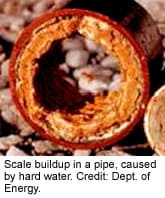
Water hardness is most simply understood as the amount of dissolved calcium and magnesium present in the water supply.
Water that is considered “Hard water” has greater levels of these dissolved minerals, calcium and magnesium. If your water hardness is elevated, after washing with soap you may feel like there is a film of residue left on your hands. This is the soap reacting with the calcium creating “soap scum”. Hard water requires more detergent or soap to clean, laundry, your hair and your hands.
Have you noticed spots or film on the glass items after pulling them out of the dishwasher? This is hard water residue which is unattractive.
Other costly issues related to overly hard water can include the impact of calcium and mineral deposits in pipes. Also, hard water that is heated, for example in your water heater, it can produce deposits of calcium carbonate reducing the efficiency and life of the water heater as well as clog pipes.
Is municipal water costing you more than just your health?
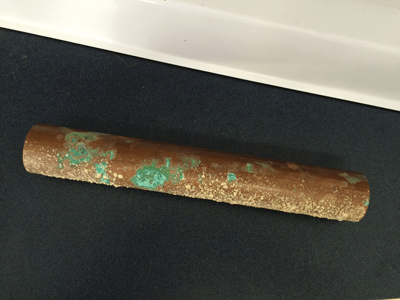
Did you know there have been multiple communities in Martin and St Lucie counties, including St Lucie West and Sailfish Point that are experiencing copper pipe leaks and failures resulting in repair costs ranging from roughly $2,000 to over $30,000 dollars with some sources blaming municipal water supply as the culprit of corrosive agents as noted in a recent TCPalm article where as one expert says;
“When there are widespread problems in a community … it is likely associated with water chemistry,” EPA environmental engineer Darren Lytle wrote. “If we can understand what it is about the water chemistry that is in common among these communities, then we start to understand what water chemistries to avoid.” We can help with copper water pipe corrosion in Port St Lucie, Stuart, Sailfish Point, FL and beyond.
Why is a home water filtration system an important health necessity?
When you care deeply about your family’s health a home water filtration system is more of a necessity than ever.
As mentioned in an article by the New York Times:
“Radon, arsenic and nitrates are common pollutants in drinking water, and trace amounts of drugs including antibiotics and hormones have also been found …”
Is Chromium-6 safe?
In an article entitled “What are the Health Risks Associated with Chromium-6?” posted on About.com under environmental issues we can read the following:
“The potentially adverse health effects of chromium-6 in drinking water have become an issue of growing concern nationwide. In 2010, the Environmental Working Group (EWG) tested tap water in 35 U.S. cities and found chromium-6 in 31 of them (89 percent). Water samples in 25 of those cities contained chromium-6 at concentrations higher than the ‘safe maximum’ (0.06 parts per billion) proposed by California regulators”
So are local samplings all below the California proposed “safe maximum”? In some cases No.
As the table from 2014 Port St Lucie, Water Quality Report shows Chromium-6 was sampled at levels as high as .10 respectively.

Excerpt Source: About.com/od/healthenvironment/What-Are-The-Health-Risks-Associated-With-Chromium-6.htm
Are there other contaminants that are unregulated or have been removed from our water quality reports like asbestos?
Yes. Antibiotics, other medications and a host of other contaminants are present in our drinking water in concerning levels.
Locally in a 2011 Port St Lucie water sampling report we see in the Range of Results ND – 31.0 which is over 400% greater than the MCL (Target Max Safe Level) of 7.
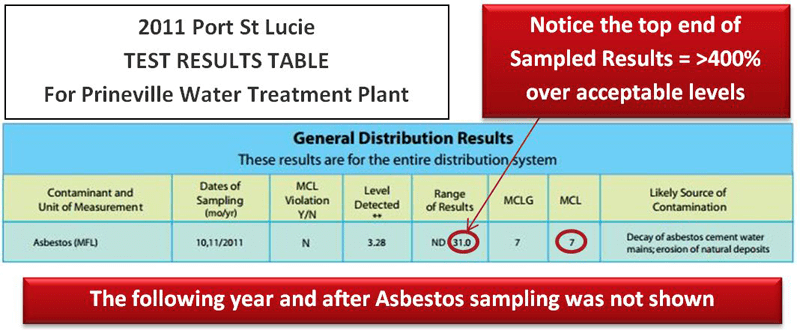
Water Contaminants removed from Port St Lucie Water Report
Sources: St Lucie County Water Quality Report
How much have municipal water costs increased in recent years?
The AWWA by way of a USA Today analysis reported the following;
“In September 2012, USA Today published an analysis of over 100 municipalities and concluded that over one-fourth increased rates over 100% in the past twelve years (McCoy, 2012). Based on the sample from the AWWA Water and Wastewater Rate Surveys, the average monthly cost of 1500 cubic feet (cf) of water rose from $22.80 in 2000 to $38.30 in 2010, a 68% increase”
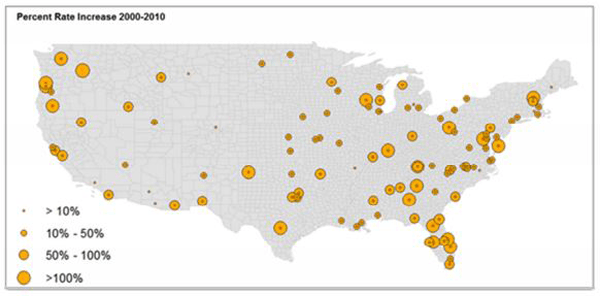
Port St Lucie Stuart Palm City Water-Rate-Increase
Source: https://growingblue.com/wp-content/uploads/2013/10/Aquanauts_Study_Data.pdf
Can water softeners help improve my septic tank performance?
The simple answer is YES! According to a study conducted by The Water Quality Research Foundation where they commissioned Virginia Polytechnic Institute and State University to conduct scientific study over 18 months with a $100,000 budget and the help of numerous professionals it was the outcome of the study that “efficiently operated water softeners improve septic tank performance…”
Source: https://www.saltinstitute.org/research/major-study-suggests-efficiently-run-softeners-do-not-hurt-septic-tank-performance/
How long does it commonly take to drill a water well?
While in many cases we can drill your well in One Day considerations such as the type of well, location, drilling formation, weather and other factors beyond our control can cause some wells to take more time. While we do share a best estimate of expected time we cannot make assurances because of those considerations that are beyond our control.
I have city water. Can I drill a well?
Yes. Brent Pump Works has drilled many wells for customers who are connected to city water.
